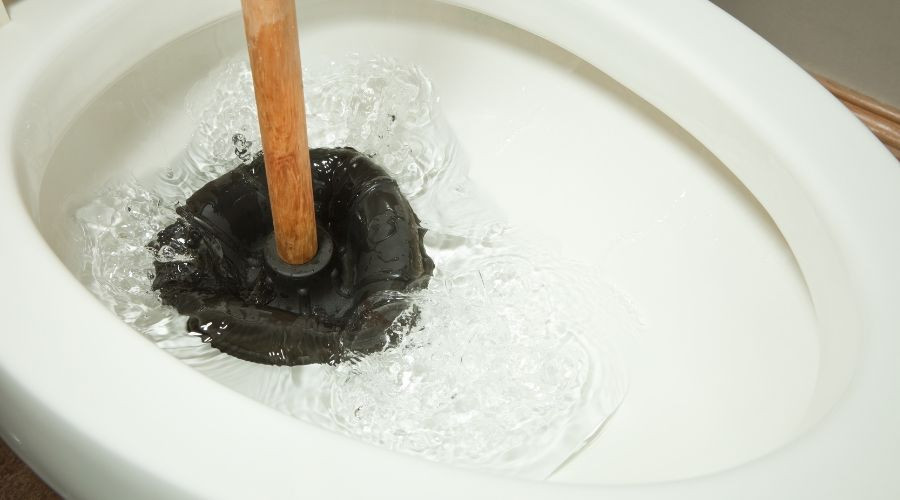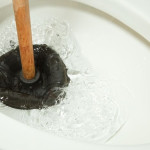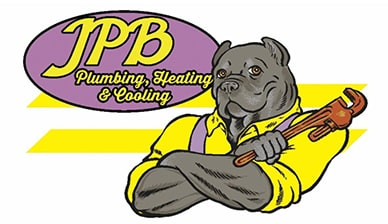Why Does The Toilet Keep Clogging?
Experiencing a clogged toilet can feel like a plumbing nightmare for any homeowner. While it often seems like an inevitable hassle, there’s good news: you can take proactive measures to keep your toilet flowing smoothly and avoid those frustrating backups.
But that’s not all—recurring clogs are more than just an annoyance; they can signal hidden plumbing issues or improper flushing habits lurking beneath the surface. In this guide, expert plumbers reveal the most common culprits behind toilet clogs and share actionable tips that will transform your bathroom experience. Get ready to say goodbye to clogs for good and keep your plumbing system in peak condition.
Be Careful About What Gets Flushed
 One of the most common causes of a clogged toilet is flushing items that should not go down the drain. The only thing that should ever be flushed is toilet paper, as it is designed to break down easily in water.
One of the most common causes of a clogged toilet is flushing items that should not go down the drain. The only thing that should ever be flushed is toilet paper, as it is designed to break down easily in water.
Tissues contain an additive called wet strength, designed to keep the fibers intact when you use them, such as blowing your nose. On the other hand, toilet paper is made with an additive that allows the fibers to disintegrate when it comes into contact with water (like in the toilet bowl). For this reason, you should only flush toilet paper, as tissues are not designed for that purpose.
Here’s a list of items homeowners should never flush:
- Paper towels
- Tissues
- Diapers
- Feminine hygiene products
- Wipes (even those labeled “flushable”)
These materials do not dissolve in water and can easily get stuck in a home’s sewer pipes, leading to a toilet clog or a clogged sewer line. Educating everyone in the household about proper flushing habits is a simple yet effective way to prevent clogs.
Use Less Toilet Paper
 Even toilet paper, when used excessively, can cause a toilet clog. Flushing large amounts of toilet paper at once can create a blockage, especially in older plumbing systems or homes with low-flow toilets. Toilet paper is designed with a water-soluble binder, allowing it to break down and disintegrate after flushing. In contrast, tissues and most other paper products are not made to dissolve quickly in water. As a result, flushing them can lead to clogs, septic system damage, and expensive household issues. To avoid this issue, homeowners can try these tips:
Even toilet paper, when used excessively, can cause a toilet clog. Flushing large amounts of toilet paper at once can create a blockage, especially in older plumbing systems or homes with low-flow toilets. Toilet paper is designed with a water-soluble binder, allowing it to break down and disintegrate after flushing. In contrast, tissues and most other paper products are not made to dissolve quickly in water. As a result, flushing them can lead to clogs, septic system damage, and expensive household issues. To avoid this issue, homeowners can try these tips:
- Use smaller amounts of toilet paper at a time.
- Flush multiple times during use instead of flushing everything all at once.
- Consider switching to a thinner or more dissolvable type of toilet paper.
These simple adjustments can help prevent clogs and keep the toilet functioning properly.
Prevent Sewer Line Clogs
Recurring toilet clogs aren’t always due to flushing habits; they can signify a clogged or damaged sewer line. Sewer lines carry waste away from your home, and blockages caused by tree roots, debris buildup, or pipe damage can disrupt this flow. When the sewer line is obstructed, waste has nowhere to go, leading to backups in toilets, sinks, and drains throughout the house. These issues require prompt attention from a professional plumber to diagnose and resolve, as ignoring them can result in more extensive damage and costly repairs.
Here are some ways that can prevent sewer line clogs:
- Avoid pouring grease, oil, or food scraps down the kitchen sink, as these can solidify and block the sewer pipes.
- Schedule regular drain cleaning to keep the pipes clear and free of debris.
- Ensure that trees and shrubs near the home do not grow roots in the sewer pipes. Root intrusion is a common cause of clogged sewer lines.
If there is a suspected issue with your sewer line, it is essential to contact a professional plumber as soon as possible. Sewer line problems can manifest in various ways, such as slow drains, sewage backups, or unpleasant odors. Attempting to resolve these issues on your own without the right tools, experience, and knowledge can not only aggravate the problem but also result in more extensive damage and significantly higher repair costs.
Professional plumbers have the expertise to accurately diagnose the issue, utilize advanced equipment, and implement effective solutions to restore your sewer line's functionality while ensuring compliance with local plumbing codes and safety standards. Don't take chances with your plumbing; reaching out to an expert can save you time, money, and stress in the long run.
About Jeffrey Burke Plumbing, Heating & Cooling
For over 35 years, the Jeffrey Burke Plumbing, Heating & Cooling team has provided quality plumbing and HVAC services to the greater Bound Brook area. They provide 5-star services and upfront pricing. Call them today for toilet repair services in Bound Brook, NJ.



